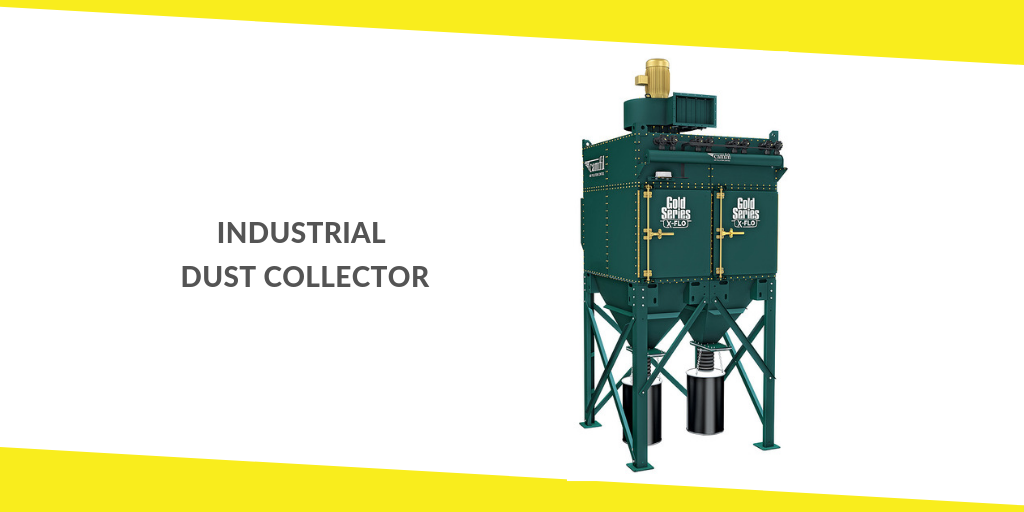Things to Consider When Choosing An Industrial Dust Collector

If you’re planning to buy or upgrade your company’s industrial dust collector, you need to consider a couple of things about the process you’re trying to control. With so many different filtration systems and equipment types to choose from, you might find yourself overwhelmed and confused about the entire thing. But, you don’t need to worry. We’ve come up with a comprehensive list to guide you towards the best industrial dust collection system for your company.
But first…
What Is an Industrial Dust Collector?
A dust collector is a huge machine that is used for collecting small dust particles and dirt present in the air or gas. Dust collectors are normally used in big industries. They collect dust and other impurities present in the air to increase the quality of the air being released.
Dust collectors were made to handle large dust-load volumes. It is made up of a blower, filter, filter-cleaning system, and a dust removal system.
There are different kinds of dust collectors depending on the kind of industry they are used in. They are:
1. Fabric Filters –or also known as a Baghouse are used for separating dust particles from dusty gases. They’re considered as one of the most effective and cost-efficient industrial dust collectors on the market.
2. Electrostatic Precipitators (ESP) –these separate dust particles from exhaust gas using electrostatic force. The contaminated gas is then sent through the passage created by discharged electrodes.
The airborne particles receive a negative charge when they are allowed to pass through the ionized field. These charged particles will then be attracted to a positive-charged electro.
3. Intertial Separators –this dust collector uses external force to separate impurities from gas streams. The dust is moved to an area where the gas stream’s forces are the lowest. They are then moved to the hopper for storage.
4. Wet Scrubber –this type of dust collector uses a scrubbing liquid that comes into contact with a gas containing dust particles. The more contact the gas and liquid has, the better chances there are for dust removal.
The gases then go through an eliminator that removes water droplets from it. What happens to the dirty water from the scrubber system? Simple. It either gets cleaned or discharged. A drag chain tank or a clarification unit removes dust from the scrubber.
5. Unit Collector –this type of dust collector is small. It’s ideal for performing a number of isolated, frequent or portable operations. They are not as expensive as other types of dust collectors, but they are not as efficient.
How to Choose an Industrial Dust Collector
Here’s a couple of tips you might find useful when it comes to choosing the right kind of industrial dust collector for your company.
1. Know Your Dust Requirements
It is necessary to be informed on the nature of your dust and how your company produces it. There are a couple of important factors you need to consider:
- Dust Particles—you need to check the qualities of your dust particles. Are they bulky and abrasive? Are they fine particulates? Next check whether they are combustible or hazardous. If you’re not sure, go get lab testing done. Educate yourself on the industry standards and local codes that are applicable to you and your company. Regulations will decide the kind of dust collector and mitigation equipment necessary for your company based on process hazard analysis and the kind of contaminant you have.
- Volume –try and take a good estimate of the quantity of dust particles you’re producing—be it in pounds per day or cubit meter per shift. This data will then be converted by your manufacturer into grains per cubic foot. The measurement will tell you what your dust loading demands are.
- Points of Origin –Try to find out where the nuisance dust is produced. This is so you can figure out the appropriate type of industrial dust collector to use. For example, a point-of-use dust collector next to the equipment is a good option if the dust originates from a single bag dump station.
- Run Time –Knowing how frequently your company produces dust is a huge factor in deciding your choice of dust collector. For example, if your company’s operations produce dust continually for 24 hours every day, then getting a continuous-duty dust collector might be the best choice for you.
- Production Demands –check and evaluate your production demands. Can you afford to stop production due to unexpected maintenance? If your company operations are important and must work round-the-clock, set that expectation upfront. This would mean sizing your dust collector appropriately.
2. Choose The Right Technology
When you have a good understanding of your dust requirements (dust characteristics, operating priorities, and points of origin) you’re able to narrow down the industrial dust collector equipment options for you. There are three basic filtration technologies to suit powder and bulk processes.
- Cartridge –this versatile dust collector is ideal for finer particles that require high-efficiency media and continuous operation. You can use this for centralized or point-of-use applications and can even be placed indoors or outdoors.
- Fluted Media Collectors –ideal for point-of-use dust requirements. It has a compact design and maintenance is very easy.
- Baghouse –ideal for high-loading, high-volume processes. The fabric component of a baghouse dust collector is ideal for challenging applications, such as high temperatures, chemical resistance, and moisture. Since it is a large equipment, it is more often than not located outdoors. It features different modes of cleaning mechanisms: reverse air technology, compressed air, and positive displacement pumps.
3. Evaluate Your Space
Taking in consideration the kind of technology you’ve chosen (or is required for your company), it’s important to think how the industrial dust collector system will fit into the space available in your facility. Check also the kind of adjustments you need to make for it to operate smoothly.
- Outdoors or Indoors? –where you place your industrial dust collector depends largely on the type and quantity of your contaminant. Getting a process hazard analysis done would make things easier for you as it doesn’t only dictate what kind of dust collector to use, but they could also decide it should be located.
- Equipment Requirements –Consider the requirements for the dust collector you’re using. For pulse-cleaned equipment, you will need a dryer and compressor that are appropriately sized to meet the compressed air requirements for the device.
Do take note of the existing power supply when evaluating your facility. You might come across installation issues if you your control panels or motor voltages do not match with your facility’s power supply.
- Style and Sizes –Once you have a good idea where to position your industrial dust collector, you can move on to deciding on the options and configurations that go with it. The most common dust collector is that has a filter housing on top and a hopper at the bottom.
Keep in mind that what goes in your dust collector has to eventually be discharged, so make sure you get the right size of discharge equipment. Consider the dust characteristics as well. Is it fibrous or agglomerative? The type of dust collected could also impact the modifications on the dust collector and discharge devices you use.
4. Total Costs
The last, but most important thing you need to keep in mind when purchasing an industrial dust collector is the cost. A dust collection system is not cheap. It can be one of the most expensive capital investments you’ll ever make for your company. When you take into account the fact that you’re adding control panels, fans, combustible dust mitigation apparatus, ancillary devices, and airlocks, then it would certainly make sense to take a look at the total operational costs including:
- DOWNTIME COSTS –if your operations are disrupted or down due to filter changes or other necessary maintenance, how badly would it impact your business? Could you afford unnecessary and unexpected downtime? It might be a good idea to have a spare set of filters or replacement parts on hand to reduce downtime costs.
- ENERGY COSTS –Two of the biggest factors that will put a huge dent on your energy costs are fan horsepower and compressed air consumption. If you’re trying to save on energy costs, use an on-demand cleaning or a VFD.
- FILTER REPLACEMENT COSTS –how often do you need to replace filters? How much would a full set of replacement filters cost? You might get commodity media at a cheaper price, but, more often than not, this results to more repeated filter changes.
If your business operations is important and you can’t afford any disruptions, it would be smart to get a dust collector with the longest filter life as possible. It’s possible to extend filter life by increasing the equipment’s size. The more media you use, the lower the filtration velocity, which results to lower pressure differential across the media. It also leads to less frequent cleaning, longer filter life and compressed air consumption. When it comes to bigger baghouses with over a hundred filters, you might want to consider having shorter pleated filter bags installed as they help reduce downtime and labor costs, unlike traditional felt bag and cage outlines.
Another thing that could incur additional costs would be the installation of a dust collection system. Don’t be afraid to ask your dust collection manufacturer to know more about what equipment and tools you need to purchase. For example, you might need to purchase a crane to set up a large baghouse, or you might need the assistance of a certified electrician to make sure the wiring of electrical components are done right. It would also be wise to have a spare set of filters ready in case you come across unexpected issues after installing the equipment.
Why an Industrial Dust Collector is Necessary
You might not be aware of it, but in industries like the pharmaceutical, chemical processing, food and agriculture, metal and woodworking, the air you breathe everyday can be compromised due to various contaminants like chemicals, gasses, dirt, dust and debris floating around. These contaminants can pose potential risks not only on your health but to your employees as well. Having a good industrial dust collection system installed can fix this problem. Dust collectors were made to remove these contaminants in the air, making your workplace a cleaner and safer place for you and everyone in the company.
- Cleaner Air=Increased Productivity
Dirt particles in the air do not only affect you and your employee’s health, but they can also settle on equipment and interfere with its mechanics. As a result your machines will become slower and eventually break down. You will end up spending a lot of money on constant repairs and upgrades. An industrial dust collector can help eliminate this risk and make your machine work as if it’s still new.
- Cleaner Air=Compliance to Regulations
Some laws and regulations on workplace safety are related to keeping the air quality in the work place within safe levels. If the air quality in your factory or work environment is poor, you would suffer the consequences not only by harming your employees’ health, but by creating potential hazards that can lead to the shut down of your factory. You can comply with government regulations with the help of dust collectors.
- Keeps Employees Healthy and Happy
The truth is, when the air quality in a factory or any workplace environment is bad, employees suffer. This leads to them being unhealthy, unhappy and unsatisfied. Unsatisfied employees don’t perform well and end up looking for work somewhere else. High employee turnover can be bad for your company so if you want to avoid that, do something to keep the air clean and healthy. A good dust collection system can improve not just the air quality but the morale of your employees, thus creating a safe and happy workplace for everyone.
By investing in an industrial dust collector, you’re ensuring that the air in your workplace and surrounding environment is clean and safe for everyone. If you are on the lookout for a dust collector for your factory or business, be sure to get them only from trusted air pollution control companies.
Recommended For You
Why Personalizing a Backpack Helps You Get the Best Out of It
Most Inside
Most Inside offers high-quality recommendations and valuable updates to enhance all aspects of your life, providing premium guidance and enriching experiences.




